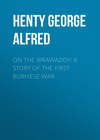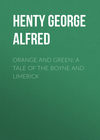Loe raamatut: «Captain Bayley's Heir: A Tale of the Gold Fields of California», lehekülg 15
CHAPTER XV.
THE MISSING HEIR
IT was a long time before the house in Eaton Square in any way recovered its former appearance. Captain Bayley had lost much of his life and vivacity, and, as the servants remarked to each other, nothing seemed to put him out. He went for his morning ride in the Park, or his afternoon visit to the Club, as usual, but his thoughts seemed far away; he passed old friends without seeing them, and if stopped he greeted them no longer with a cheery ring in his voice, or a quick smile of welcome. Every one who knew him remarked that Bayley was going down hill terribly fast, and was becoming a perfect wreck.
Frank's name was never now mentioned in the house. Its utterance had not been forbidden, but it had been dropped as a matter concerning which a hopeless disagreement existed. Alice had changed almost as much as her uncle. Her spirits were gone; her voice was no longer heard singing about the house; she no longer ran up and down the stairs with quick springing footsteps, and indeed seemed all at once to have changed from a young girl into a young woman. Sometimes, as she sat, the tears filled her eyes and rolled fast down her cheeks; at other times she would walk about with her eyebrows knitted, and hands clenched, and lips pursed together, a little volcano of suppressed anger.
Although no discussion on the subject had taken place between her and her guardian, it was an understood thing that she maintained her opinion, and that she regarded Fred Barkley as an enemy. If she happened to be in the room when he was announced, she would rise and leave it without a word; if he remained to a meal, she would not make her appearance in the dining or drawing rooms.
"Alice still regards me as the incarnation of evil," Fred said, with a forced laugh, upon one of those occasions.
"The child is a trump," Captain Bayley said warmly, "a warm lover and a good hater. What a thing it is," he said, with a sigh, "to be at an age when trust and confidence are unshakable, and when nothing will persuade you that what you wish to believe is not right; what would I not give for that child's power of trust?"
The household in Eaton Square were almost unanimous in Frank's favour. His genial, hearty manners rendered him a universal favourite with the servants; and although none knew the causes of Frank's sudden disappearance, the general opinion was that, whatever had happened, he could not have been to blame in the matter.
His warmest adherent was Evan Holl, who had months before been introduced to the house as assistant knife and boot cleaner by Frank. He did not sleep there, going home at nine o'clock in the evening when his work was done.
"Do you know, Harry," he said, one day, "what a rum crest, as they calls it, – I asked the butler what it meant, and he says as how it was the crest of the family – Captain Bayley has; he's got it on his silver, and I noticed it when I was in the pantry to-day helping the butler to clean some silver dishes which had been lying by unused for some time. 'All families of distinction,' the butler said, – he is mighty fond of using hard long words – 'all families of distinction,' says he, ''as got their own crest, which belongs to them and no one else. Now this 'ere crest of the guv'nor's is a hand holding a dagger, and the hand has only got three fingers.' I said as how there was two missing, and that the chap as did it couldn't have known much of his business to go and leave out two fingers. But the butler says, 'That's your hignorance,' says he; 'the hand 'as got only three fingers because a hancestor of the Captain's in the time of the Crusaders' – 'And what's the Crusaders?' says I. 'The Crusaders was a war between the English and the Americans hundreds of years ago,' says he."
Harry burst into a shout of laughter. "Mr. Butler does not know anything about it, for the Crusades were wars between people who went out to the Holy Land to recover the Holy Sepulchre from the Turks who held it."
"Ah, well," Evan said, "it don't make no odds whether they was Turks or Americans. However, the butler says as how the Captain Bayley what lived in those days, he saw a red Injun a-crawling to stab the king, who was a-lying asleep in his tent, and just as his hand was up to stick in the knife, Captain Bayley he gives a cut with his sword which whips off two of the fingers, and before the Injun could turn round and go at him he gives another cut, and takes off his hand at the wrist, and the next cut he takes off his head; so the hand with three fingers holding a dagger was given him to carry as a crest. I suppose after a time the hand got wore out, or got bad, so as he couldn't have carried it about no longer, and instead of that, as a kind of remembrance of the affair, he 'as them put on his forks and spoons."
Mrs. Holl had been listening with grave interest to the narrative.
"Does I understand you to say, Evan, that no other family but that of the master's put this three-fingered hand with a knife on to their things?"
"That's so, mother; leastways it's what the butler says about it."
"Then if that's the case," Mrs. Holl said thoughtfully, "any one who has got this crest, as you calls it, on his things must be a relation of the Captain."
"I suppose so, mother; he might be a long distance off, you know, because this ere affair took place hundreds of years ago, and there may be a lot of the same family about in different parts."
"So there might," Mrs. Holl said, in a disappointed voice.
"Why, mother," Harry said, "one would think it made some difference to you, you speak so mournfully about it."
"It don't make no difference to me, Harry," Mrs. Holl said, "but it makes a lot of difference to you. You know I told you two or three months ago how you come to be here. I don't know as I told you that round the neck of your mother, when she died in that room, was a bit of silk ribbon, and on it was a little seal of gold, with a red stone in it, which I put by very careful for you, though what good such a thing would do to you, or anybody else, I didn't see. Well, on that red stone there was something cut; and father he took it to a chap as understands about those things, who got some red wax, and hotted it, and dropped some of it on a paper, and then squeezed this 'ere stone down on it, and looks at the mark through a eye-glass, and he tells father that it was a hand with three fingers holding a dagger."
"That was curious, mother," Harry said, "very curious. Can you fetch me the seal and let me have a look at it? I don't remember ever having seen it."
The seal was fetched by Mrs. Holl from a pill-box, in which it was carefully stored away in the corner of a drawer. Harry examined it closely.
"It looks like a hand holding a dagger," he said, "but it's too small for me to see whether it has three fingers or four. Evan, will you run round with it to the little watchmaker's in the next street, and ask him to look at it with one of the glasses he sticks in his eye when he is at work, and to tell you whether it has three fingers or four."
Evan returned in a few minutes with the news that the watchmaker at once said that the hand had but three fingers.
"Well, from that, Harry," Mrs. Holl said, "if what this man have been and told Evan is right, you must be some relation to Captain Bayley."
"A cousin, fifty times removed, perhaps," Harry laughed, "but at any rate, it is pleasant to be able to think that I come of a good family."
"You knew that before, Harry," Mrs. Holl said severely, "for I told you over and over again that your mother was a lady, though she was in bad circumstances, and I think, after charring in respectable houses for the last twenty years, I ought to know a lady when I sees one. Well, there's nothing as you think I could do about it?"
"I should think not," Harry laughed. "How the old gent would stare if Evan was to walk up to him and say, 'Captain Bayley, I have got a foster-brother at home who, I think, is a relation of yours.' That would be a nice piece of cheek, wouldn't it?"
Evan laughed.
"However, mother, I votes as in future we calls Harry Harry Bayley instead of Harry Holl."
"You won't do anything of the sort, Evan," the cripple lad answered hotly. "Holl's my name, and you don't suppose I am going to drop the name of the father and mother who brought me up, and have tended me all these years, for Bayley or any other name; besides, even if it should turn out that I am remotely connected with the family, there is no reason why my name should be Bayley, for, of course, if my mother had been a Bayley, she would have changed her name when she married."
Harry thought but little more of the matter, but Mrs. Holl turned it over frequently in her mind, and discussed it with John. John said, "He didn't think much would come of it; still, he didn't see as how there could be any harm in asking, seeing that she had set her mind on it."
So Mrs. Holl resolved to move in the matter. Evan, on being appealed to, said that he did not see how she was to get to speak with Captain Bayley; the footman wouldn't be likely to show her in to his master unless she stated her business. But after much pressing, and declaring over and over again he wished he had never said a word about the hand with three fingers, Evan consented, if he found an opportunity, to ask Captain Bayley to see his mother. This opportunity, however, did not arrive, Evan's duties never bringing him in contact with his employer. At last Mrs. Holl became desperate, and one morning, after breakfast, she went to Captain Bayley's house. The ring at the area-bell brought out the cook.
"What is it?" she said sharply.
"I am the mother, ma'am, of Evan, as works here."
"Well, come down, if you want to see him."
"I don't want to see him, I want to see Captain Bayley."
"I will tell the footman," the cook said, "but I don't think it likely as you can see the Captain."
The footman soon made his appearance. Fortunately he was very young, and had not yet acquired that haughtiness of manner which characterises his class. Evan had before told him that his mother wanted to see Captain Bayley, and had begged him to do his best, should she come, to facilitate her doing so.
"Good morning," he said. "Your boy told me you would be likely enough coming. So you want to see the Captain; he has just finished his breakfast and gone into the study. Now, what shall I say you wants to see him for? I can't show you in, you know, without asking him first."
The young footman was, indeed, curious to know what Mrs. Holl's object could be in wishing to see his master. Evan had resisted all his attempts to find out, simply saying that it was a private affair of his mother's.
"Will you say to him," Mrs. Holl said, "that the mother of the boy as works here under you is most anxious for to see him just for two or three minutes; that it ain't nothing to do with the boy, but she wishes particular to ask Captain Bayley a question – if he will be so good as to see her – that no one else but hisself could answer."
"It's a rum sort of message," the young footman said, "but, anyhow, I will give it; the Captain ain't as hot-tempered as he used to be, and he can but say he won't see you."
Captain Bayley looked mystified when the footman delivered Mrs. Holl's message to him; then he remembered that it was Frank who had introduced her son to help in the house, and he wondered whether her errand could have any connection with him.
"Well, show her up, James," he said; "but just tell her that my time is precious, and that I don't want to listen to long rambling stories, so whatever she has got to say, let her say it straight out."
"It's all right," James said, as, descending to the kitchen, he beckoned Mrs. Holl to follow him; "but the Captain says you are to cut it short; so if you wants an answer you had best put your question, whatever it is, short and to the point, or he will snap you up in a minute, I can tell you."
Mrs. Holl followed into the library. She was at no time a very clear-headed thinker, and the difficulty of putting her question into a few words pressed heavily upon her.
"Now, my good woman, what is it?" Captain Bayley said, as she entered. "I am going out in a few minutes, so come straight to the point, if you please."
"I will come as straight as I can, sir," Mrs. Holl said breathlessly, "but indeed, sir, I am a bad hand at explaining things, and if you snaps me up I shall never get on with it."
Captain Bayley smiled a little. "Well, I will try and not snap you up if you will come to the point. Now, what is the point?"
"The point, sir," Mrs. Holl said despairingly, "is a hand with three fingers a-holding of a dagger."
Captain Bayley looked astonished. "You mean my crest," he said; "why, what on earth are you driving at?"
"Evan saw it on the forks," Mrs. Holl explained.
"Yes, no doubt he did," Captain Bayley said; "but what of that? That's my crest."
"Yes, sir, so Evan said, and when he told me it just knocked me silly like, and says I to him, says I – "
"Never mind what you said to him," Captain Bayley broke in, "what is it you want to say to me? What is there curious in my crest being on my spoons? Now just wait one minute, and tell me as plainly as you can."
Mrs. Holl waited a minute.
"Well, sir, it struck me all in a heap, because I've got in the house a thing with just such another hand, a-holding of a knife in it."
"Oh!" Captain Bayley said, "you have got some article with my crest on it in your house. How did you come by it? It must have been stolen."
"No, sir, I will take my davey as the young person as was my son Harry's mother never stole nothing in her life."
"The young person who was your son Harry's mother," Captain Bayley repeated, in a somewhat puzzled tone. "Are you talking of yourself?"
"Lor' no, sir, the young person."
"But what young person do you mean? How can any young person have been your son Harry's mother except yourself?"
"He ain't really my son, you see, sir; he is the son of a young person who we took in, John and I, and who died at our house; Harry is her son."
A great change passed over Captain Bayley's face, the expression of impatience died out, and was succeeded by one almost of awe. He dropped the paper which he had hitherto held in his hand, and leaning forward he asked in low tones —
"Do you mean that a woman who had in her possession some article with my crest on it, and who had a child with her, died in your house?"
"Yes, sir, that's what I mean; the article is a little gold seal, with a red stone to it."
"How long ago was this?" came slowly from Captain Bayley's lips.
"About seventeen years ago," Mrs. Holl said. "The mother died a few days afterwards; the child is our Harry; and I came to ask you – but, good lawks!"
An ashen greyness had been stealing across the old officer's face, and Mrs. Holl was terrified at seeing him suddenly fall forward across the table.
She rushed to the door to ask for help. James was in the hall, having waited there, expecting momentarily to hear his master tell him to show his visitor out. He began to utter exclamations of dismay at seeing his master's senseless figure.
"I will lift him up," she said. "Run and fetch the butler and the cook, and then go for the doctor as quick as you can run; he has got a stroke."
The butler was first upon the scene. Mrs. Holl had already lifted Captain Bayley into a sitting position. "I have taken off his necktie and opened his collar," she said. The butler, who was unaware of Mrs. Holl's presence there, was astonished at the scene.
"Who are you?" he gasped, "and what have you been doing to the Captain? If you have killed him it will be a hanging matter, you know."
"Don't you be a fool," retorted Mrs. Holl sharply, "but run for some water; he has got a stroke, though what it came from is more nor I can tell."
To be called a fool by this unknown woman of coarse appearance roused the butler's faculties. He was sincerely attached to his master, and without reply he at once hurried away for water.
In five minutes the doctor, who lived close by, entered. Mrs. Holl was still holding up the insensible man; Alice stood crying beside her, the servants were looking on.
"Open the windows," he said.
Then he felt the Captain's pulse. For some time he stood silent; then he said —
"Lay him down at full length on the couch." Mrs. Holl, without the least effort, lifted the slight figure and laid it on the sofa.
"Now," the doctor said, "will you all leave the room except Miss Hardy and you?" he nodded to Mrs. Holl. As the servants retired reluctantly, the butler said —
"Please, sir, I don't know whether you know it, but that woman was with him alone when he got insensible. I don't know what she did to him, but I should recommend that we should have a policeman in readiness."
"Nonsense," the surgeon said. "However, it will be better that she should retire; but let her wait outside, close at hand, in case he wishes to speak to her."
Sarah Holl followed the servants into the hall. The doctor poured a few drops of cordial between Captain Bayley's lips, and placed some strong salts beneath his nostrils.
"You think he will come round?" Alice asked.
"He will come round," the doctor said confidently; "his pulse is gaining power rapidly. It is not paralysis, but a sort of fainting-fit, brought on, I should imagine, by some sudden shock; his heart is weak, and there was a sudden failure of its powers. I have warned him over and over again not to excite himself. However, I think there is no great harm done this time; but he must be careful in future; another such attack and it might go hard with him. See, he is coming round." In a few minutes Captain Bayley opened his eyes and looked round vaguely.
"Lie quiet for a little while, my dear sir," the doctor said cheerfully; "you have been ill, a sort of fainting-fit, but you will be all right in a short time. Drink this glass of cordial." He lifted his patient's head, and held the glass to his lips. As Captain Bayley drank it Alice placed a pillow under his head.
"How was it?" Captain Bayley asked, in a low tone.
"We don't know," the Doctor said; "but don't think about it at present. What you have to do now is to get quite strong again; it will be time afterwards for you to think what upset you. You have given Miss Hardy here quite a fright."
Captain Bayley nodded to Alice. "I never did such a thing before," he said. "I was reading here in the library – " Then he stopped, a sudden flush came to his face.
"Don't agitate yourself, my dear sir," the Doctor said soothingly, "agitation now would be a very serious thing. Drink a little more of this."
Captain Bayley did as he was told, and then asked —
"Where is the woman who was speaking to me?"
"She is outside," the Doctor said. "I told her to wait. But you really must not see her for a time."
"I am all right now," Captain Bayley said, rising to his elbow, "and it will agitate me less to see her than to wait. She brought me very strange news, news which I never thought to hear. It is not bad news, my dear," he said, to Alice, "it is the best news I ever heard. You need not go away, Doctor," he said, seeing the physician was preparing to leave; "you are an old friend, and know all about it; besides, it is no secret. You know how I searched for very many years for my daughter and her child, and came at last to the conclusion that both must be dead, for she was in a dying state when last heard of. Well, I have found that the boy is alive. He has been brought up by the woman who is the mother of a boy who works here."
"Oh! I know," Alice exclaimed, "Frank told me the story. She had told him about a woman who had fallen down at her door years ago, and how she had brought up the child. But O uncle!" she said pitifully, "I have a sad thing to tell you. Frank said that he was such a nice boy, so clever and good. Frank used to go and help him with his books, and he can read Latin and all sorts of things; but, uncle, he met with an accident when he was little, and he is a cripple."
For a minute Captain Bayley was silent.
"It is part of my punishment, dear," he said at last, "God's will be done. However, cripple or not, I am thankful to find that, from what you say, he is a boy whom I can own without shame, for the thought has troubled me always, that, should Ella's son be alive, he might have grown up a companion of thieves, a wandering vagabond. Thank God, indeed, it is not so! I am glad you told me, Alice. Now, let me see this good woman who has been a mother to him."
Mrs. Holl was again called in, and was asked to sit down.
"The question you wished to ask me," Captain Bayley said, "was, I suppose, whether I could give you any clue as to who was the woman you took in, and whose child you adopted? She was my daughter."
"Lor', sir!" Mrs. Holl exclaimed, "who would have thought such a thing?"
"Who, indeed," Captain Bayley repeated; "but so it was. For years I sought for her in vain, and had long since given up all hope of ever hearing of her. Have you got the seal with you?"
After some search Mrs. Holl produced from the corner of her capacious pocket the seal, carefully wrapped up in paper.
"That is it," Captain Bayley said, with a sigh. "Alice, go to my desk, open the inner compartment, and there you will see the fellow to it." Alice did as he requested.
"There, you see, Doctor, they are exactly alike. They were both made at the same time, soon after I returned from India, and now, Mrs. Holl, please tell us the whole story as I understand you told it to my nephew."
Mrs. Holl repeated the story in nearly the same words that she had used to Frank.
"God bless you!" Captain Bayley said, when she finished. "No words can tell how grateful I am to you, or how deeply I am moved at the thought of the kindness which you and your husband, strangers as you were to her, showed to my poor girl. I hope you will not mind sparing him to me now; your claims are far greater than mine, but you have other children, while I, with the exception of my ward here, am alone in the world."
"Lor', sir," Mrs. Holl said, wiping her eyes with her apron, "of course we will spare him. We shall miss him sorely, for he has indeed been a comfort and a blessing to us; but it is for his good, and you won't mind his coming to see us sometimes."
"Mind!" Captain Bayley exclaimed, "he would be an ungrateful rascal if he did not want to come and see you constantly. Well, if you will go home and prepare him a little, I will come round this afternoon and see him. It's no use shaking your head, Doctor, I feel myself again now; but I will lie down till lunch-time, and will promise not to excite myself."



















